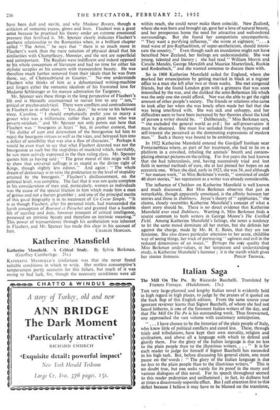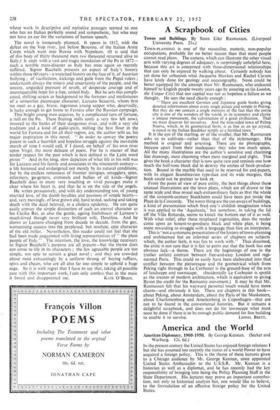Italian Saga
The Mill On The Po. By Riccardo Bacchelli. Translated by Frances Frenaye. (Hutchinson. 15s.) Tms very large-planned and lengthy Italian novel is evidently held in high regard in high places, to judge by the praises of it quoted on the back flap of this English edition. From the same source your ignorant reviewer learns that Signor Bacchelli, of whom she had not heard hitherto, is one of the foremost Italian writers of the day, and that The Mill On The Po is his outstanding work. Thus forewarned, one approached the vast volume with cautionary anticipation.
" . I have chosen to be the historian of the plain people of Italy, who knew little of political conflicts and cared less. These, through trials and tribulations, have kept their own morality, religion and civilisation, and above all a language with which to defend and glorify them. For the glory of the Italian language is due no less to the plain people than to the illustrious writers. . . . " It is for each reader to judge for himself if Signor Bacchelli has succeeded in his high task. But, before discussing his general claim, one must pause on the' words : " The glory of the Italian language is due no less to the plain people than to the illustrious writers." This is no doubt true, but one seeks vainly for its proof in the many and various dialogues of this novel. For its speech throughout seemed to this reader pedestrian and unilltunined ; in fact, its dullness had at times a disastrously soporific effect. But I call attention first to this defect because I believe it may Dave to be blamed on the translator, whose work in descriptive and narrative passages seemed to one who has no Italian perfectly sound and sympathetic, but who may not have an ear for the variations of human speech.
The novel is immensely planned. It opens in 1812, with the defeat on the Vop river, just before Beresina, of the Italian Army Corps which went into Russia with Napoleon. (It is said that of this body of thirty thousand men two thousand returned alive to Italy.) It ends with a vast and tragic inundation of the Po in 1872— such a terrible mass-disaster as Italy has once again so recently suffered. Signor Bacchelli presents an aspect of Italy's history within those 60 years—a wretched history on the face of it, of Austrian bullying ; of vacillations, kickings and guile from the Papal rulers ; underneath always the misery and uncertainty of the people, and the uneasy, unguided pressure of revolt, of desperate courage and of unconquerable hope for a free, united Italy. But he sets this compli- cated, shifting screen as background to the fortunes and misfortunes of a somewhat picaresque character, Lazzaro Scacerni, whom first we meet as a gay, brave, ingenious young sapper who, deservedly, is lucky enough to get home to Ferrara after the Russian campaign.
This bright young man acquires, by a complicated turn of fortune, a mill on the Po. These floating mills (only a very few left now), moored to the banks of their dangerous river, and with a very old tradition and a kind of guild-spirit, milling, the best flour in the world for Ferrara and for all their region, are, the author tells us, his major inspiration in this novel. " In order to convey the poetry patent in such a heartfelt and hopeless struggle against the inevitable march of time I would call, if I dared, on behalf of his own river upon Virgil, the most delicate of poets. For he is master of that tender respect for the past which is best defined in the Latin word pietas " And in his long, slow depiction of what life in his mill was for Lazzaro and his family and associates in the nineteenth century— a life harassed and endangered not merely by its natural conditions, but by the endless rottenness of frontier intrigues, smugglers, spies, informers, go-getters, criminals and bullies of all kinds—Signor Bacchelli does in many very touching or vivid passages make it clear where his heart is, and that he is on the side of the angels.
He writes persuasively, and with dry understanding too, of young married love, of the dumb loyalties and passions of simple hearts— and, very movingly, of love grown old, hard tested, seeking and taking death with the dead beloved, in a cholera epidemic. He can quite easily convey the simple distinction of such an eternal character as his Cecilia Rei, as also the gentle, ageing foolishness of Lazzaro's much-loved though never very brilliant wife, Dosolina. And he shows us Lazzaro changing from decade to decade, from the gay, womanising success into the perplexed, but resolute, epic character of the old miller. Nevertheless, this reader could not feel that she had been made acquainted with living representatives of " the plain people of Italy." The intention, the love, the knowledge necessary to Signor Bacchelli's purpose are all present—but the theme does not come to life in its characters ; the few agreeable people are too simple, too epic to sustain a great novel ; and they are crowded about most exhaustingly by a uniform throng of boring ruffians, spivs and cheats, who are all also far too simple to uphold a huge saga. So it is with regret that I have to say that, taking all possible care with this important work, I call only confess that in the main



































 Previous page
Previous page